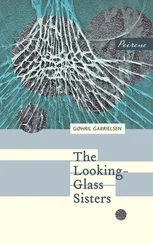M. (Arnaud) Berquin - The Looking-Glass for the Mind; or, Intellectual Mirror
Здесь есть возможность читать онлайн «M. (Arnaud) Berquin - The Looking-Glass for the Mind; or, Intellectual Mirror» — ознакомительный отрывок электронной книги совершенно бесплатно, а после прочтения отрывка купить полную версию. В некоторых случаях можно слушать аудио, скачать через торрент в формате fb2 и присутствует краткое содержание. Жанр: foreign_antique, foreign_prose, на английском языке. Описание произведения, (предисловие) а так же отзывы посетителей доступны на портале библиотеки ЛибКат.
- Название:The Looking-Glass for the Mind; or, Intellectual Mirror
- Автор:
- Жанр:
- Год:неизвестен
- ISBN:нет данных
- Рейтинг книги:4 / 5. Голосов: 1
-
Избранное:Добавить в избранное
- Отзывы:
-
Ваша оценка:
- 80
- 1
- 2
- 3
- 4
- 5
The Looking-Glass for the Mind; or, Intellectual Mirror: краткое содержание, описание и аннотация
Предлагаем к чтению аннотацию, описание, краткое содержание или предисловие (зависит от того, что написал сам автор книги «The Looking-Glass for the Mind; or, Intellectual Mirror»). Если вы не нашли необходимую информацию о книге — напишите в комментариях, мы постараемся отыскать её.
The Looking-Glass for the Mind; or, Intellectual Mirror — читать онлайн ознакомительный отрывок
Ниже представлен текст книги, разбитый по страницам. Система сохранения места последней прочитанной страницы, позволяет с удобством читать онлайн бесплатно книгу «The Looking-Glass for the Mind; or, Intellectual Mirror», без необходимости каждый раз заново искать на чём Вы остановились. Поставьте закладку, и сможете в любой момент перейти на страницу, на которой закончили чтение.
Интервал:
Закладка:
THE ABSURDITY OF YOUNG PEOPLE'S WISHES EXPOSED
The present moment of enjoyment is all young people think of. So long as master Tommy partook of the pleasure of sliding on the ice, and making snow up in various shapes, he wished it always to be winter, totally regardless of either spring, summer, or autumn. His father hearing him one day make that wish, desired him to write it down in the first leaf of his pocket-book; which Tommy accordingly did, though his hand shivered with cold.
The winter glided away imperceptibly, and the spring followed in due time. Tommy now walked in the garden with his father, and with admiration beheld the rising beauty of the various spring flowers. Their perfume afforded him the highest delight, and their brilliant appearance attracted all his attention. "Oh!" said master Tommy, "that it were always spring!" His father desired him to write that wish also in his pocket-book.
The trees, which lately were only budding, were now grown into full leaf, the sure sign that spring was departing, and summer hastening on apace. Tommy one day, accompanied by his parents, and two or three of his select acquaintance, went on a visit to a neighbouring village. Their walk was delightful, afforded them a prospect sometimes of corn, yet green, waving smoothly, like a sea unruffled with the breeze, and sometimes of meadows enamelled with a profusion of various flowers. The innocent lambs skipped and danced about, and the colts and fillies pranced around their dams. But what was still more pleasing, this season produced for Tommy and his companions a delicious feast of cherries, strawberries, and a variety of other fruits. So pleasant a day afforded them the summit of delight, and their little hearts danced in their bosoms with joy.
"Do you not think, Tommy," said his father to him, "that summer has its delights as well as winter and spring?" Tommy replied, he wished it might be summer all the year; when his father desired him to enter that wish in his pocket-book also.
The autumn at length arrived, and all the family went into the country to view the harvest. It happened to be one of those days that are free from clouds, and yet a gentle westerly wind kept the air cool and refreshing. The gardens and orchards were loaded with fruits, and the fine plums, pears, and apples, which hung on the trees almost to the ground, furnished the little visitors with no small amusement and delight. There were also plenty of grapes, apricots, and peaches, which were the sweeter, as they had the pleasure of gathering them. "This season of rich abundance, Tommy," said his father to him, "will soon pass away, and stern and cold winter will succeed it." Tommy again wished that the present happy season would always continue, and that the winter would not be too hasty in its approaches, but leave him in possession of autumn.
Tommy's father desired him to write this in his book also, and, ordering him to read what he had written, soon convinced him how contradictory his wishes had been. In the winter, he wished it to be always winter; in the spring, he wished for a continuance of that season; in the summer, he wished it never to depart; and when autumn came, it afforded him too many delicious fruits to permit him to have a single wish for the approach of winter.
"My dear Tommy," said his father to him, "I am not displeased with you for enjoying the present moment, and thinking it the best that can happen to you; but you see how necessary it is that our wishes should not always be complied with. God knows how to govern this world much better than any human being can pretend to. Had you last winter been indulged in your wish, we should have had neither spring, summer, nor autumn; the earth would have been perpetually covered with snow. The beasts of the field, and the fowls of the air, would either have been starved or frozen to death; and even the pleasures of sliding, or making images of snow, would have soon become tiresome to you. It is a happiness that we have it not in our power to regulate the course of nature: the wise and unerring designs of Providence, in favour of mankind, would then, most probably, be perverted to their own inevitable ruin."
LOUISA'S TENDERNESS TO THE LITTLE BIRDS IN WINTER
However long the winter may appear, the spring will naturally succeed it. A gentle breeze began to warm the air, the snow gradually vanished, the fields put on their enamelled livery, the flowers shot forth their buds, and the birds began to send forth their harmony from every bough.
Little Louisa and her father left the city, to partake of the pleasures of the country. – Scarcely had the blackbird and the thrush begun their early whistle to welcome Louisa, than the weather changed all on a sudden; the north wind roared horribly in the grove, and the snow fell in such abundance, that every thing appeared in a silver-white mantle.
Though the little maid went to bed shivering with cold, and much disappointed in her expectations, yet she thanked God for having given her so comfortable a shelter from the inclemency of the elements.
Such a quantity of snow had fallen during the night, that the roads were almost impassable in the morning, which was a matter of great affliction to poor Louisa; but she observed, that the birds were as dull as herself upon the occasion. Every tree and hedge being so covered with snow, that the poor birds could get nothing to eat; not so much as a grain of corn or worm to be found.
The feathered inhabitants now forsook the woods and groves, and fled into the neighbourhood of inhabited towns and villages, to seek that relief from man, which nature alone would not then afford them. Incredibly numerous were the flight of sparrows, robins, and other birds, that were seen in the streets and courtyards, where their little beaks and claws were employed in turning over whatever they thought could afford them a single grain.
A large company of these feathered refugees alighted in the yard belonging to the house in which little Louisa and her father then were. The distress of the poor birds seemed to afflict the tender-hearted maid very much, which her father perceived as soon as she entered his chamber. "What is it makes you look so pensive now," said her father, "since it is but a few minutes ago when you were so remarkably cheerful?" – "O my dear papa!" said Louisa, "all those sweet birds, that sung so charmingly but a day or two ago, are now come into the yard starving with hunger. Do, pray, let me give them a little corn!"
Her papa very readily granted her so reasonable a request, and away she ran, accompanied by her governess, to the barn on the other side of the yard, which had that morning been cleanly swept. Here she got a handful or two of corn, which she immediately scattered in different parts of the yard. The poor little birds fluttered around her, and soon picked up what the bounty of her generous hand had bestowed on them.
It is impossible to describe the pleasure and satisfaction expressed in the countenance of Louisa, on seeing herself the cause of giving so much joy to those little animals. As soon as the birds had picked up all the grains, they flew to the house-top, and seemed to look down on Louisa as if they would say, "Cannot you give us a little more?" She understood their meaning, and away she flew again to the barn, and down they all came to partake of her new bounty; while Louisa called to her papa and mamma to come and enjoy with her the pleasing sight.
In the mean time, a little boy came into the yard, whose heart was not of so tender a nature as Louisa's. He held in his hand a cage full of birds, but carried it so carelessly, that it was evident he cared very little for his poor prisoners. Louisa, who could not bear to see the pretty little creatures used so roughly, asked the boy what he was going to do with those birds. The boy replied, that he would sell them if he could; but, if he could not, his cat should have a dainty meal of them, and they would not be the first she had munched alive.
Читать дальшеИнтервал:
Закладка:
Похожие книги на «The Looking-Glass for the Mind; or, Intellectual Mirror»
Представляем Вашему вниманию похожие книги на «The Looking-Glass for the Mind; or, Intellectual Mirror» списком для выбора. Мы отобрали схожую по названию и смыслу литературу в надежде предоставить читателям больше вариантов отыскать новые, интересные, ещё непрочитанные произведения.
Обсуждение, отзывы о книге «The Looking-Glass for the Mind; or, Intellectual Mirror» и просто собственные мнения читателей. Оставьте ваши комментарии, напишите, что Вы думаете о произведении, его смысле или главных героях. Укажите что конкретно понравилось, а что нет, и почему Вы так считаете.











